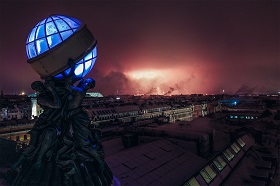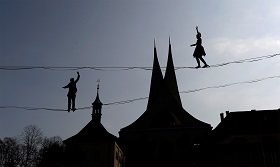“The existing gap between Russia and the European Union could hardly be deeper. Russian leaders have been obsessed with a large-scale conventional European war scenario. This obsession at least partially explains why Russia is so concerned about the NATO enlargement and the US military infrastructure deployment in Central Europe. One can argue that the Russian strategic culture is rooted in history, but, as I see it, it does not fully capture the new security realities of the XXI century. As for the European Union, it has essentially outsourced its traditional security agenda to the United States and NATO. It is not yet clear whether the idea of an EU 'strategic autonomy from Washington becomes anything more than an idea. This is why I emphasize the 'soft' security agenda between Russia and EU — here the asymmetry is not so striking.”
Interview with Andrey Kortunov, Director General of the Russian International Affairs Council, for the EU-Russia Expert Network website.
— The EU-Russia Expert Network devoted its 10th meeting exclusively to the role that the EU and Russia play in European Security — at a time when there is practically no prospect of common ground emerging. Why do you think this is an important discussion? Where do you see EUREN's value being added in this debate?
— I would not go as far as to state that there is no prospect of common ground on security matters between Russia and the European Union. For the time being, opportunities are indeed limited, but they are still broader than those between Russia and NATO. The Union is not particularly strong on hard security matters, but we have a rising agenda of nonconventional security problems, which should be a matter of concern for both sides. In my view, we should keep an eye on even very limited opportunities for cooperation — or coordination — in areas such as cybersecurity, international terrorism, migrations management, and so on. Besides, Russia and the EU can jointly strengthen pan-European security-focused institutions, above all OSCE.
— What are the most important challenges to European Security in 2019 and beyond? Do you think the main risks lie within the European continent, and can they be addressed, therefore, by European nations, including Russia themselves? Or have they more to do with the shifting international context, in other words, with the changing policies of actors, such as the US and China, which are, more or less, out of reach for European actors?
— We should distinguish between immediate, situational challenges and longer-term security threats. Tomorrow, we may witness an unexpected escalation in places like Nagorno Karabakh or Donbass. We are not well protected against various accidents resulting from miscalculations or technical error. However, most of the strategic challenges for both Russia and the EU, in my view, are likely to come from the changing international context. For instance, the MENA region will continue to be a source of instability for a long, long time. Russia and its Western neighbors are too close to the Middle East to insulate themselves from this instability. I believe that global climate change and its likely repercussions also constitute a formidable challenge to all European nations. It is very sad that both sides are wasting precious time today and do not get ready for the 'perfect storm', which is already looming on our common horizon.
— What are Russia's main priorities regarding European Security? How do they differ, in your view, from the EU's main priorities? Which of those differences are insurmountable, which can be overcome and how?
— The existing gap between Russia and the European Union could hardly be deeper. Russian leaders have been obsessed with a large-scale conventional European war scenario. This obsession at least partially explains why Russia is so concerned about the NATO enlargement and the US military infrastructure deployment in Central Europe. One can argue that the Russian strategic culture is rooted in history, but, as I see it, it does not fully capture the new security realities of the XXI century. As for the European Union, it has essentially outsourced its traditional security agenda to the United States and NATO. It is not yet clear whether the idea of an EU 'strategic autonomy from Washington becomes anything more than an idea. This is why I emphasize the 'soft' security agenda between Russia and EU — here the asymmetry is not so striking.
— The network focused, among other things, on three regional theaters: the Black Sea region, the Baltic Sea region, and the Arctic. The Black Sea and the Baltic Sea have seen increasing tensions in the past, whereas geostrategic conflict has not (yet) taken root in the Arctic. What can Russia and the EU do to decrease tensions in those theaters?
— These are three very specific cases. The Arctic region is one of the very few positive examples of cooperation between Russia and the West not directly affected by the intense geopolitical confrontation of the last couple of years. I suspect that we were able to keep this cooperation alive and well, mainly because both Russia and the West were capable of keeping it below the political radar screen. Unfortunately, nobody can guarantee that the current multilateral cooperation in the Arctic will not become yet another victim of adversarial relations between Russia and the West. The Baltic Sea was a real pain in the neck some five years ago, but today, I see no immediate high-security risks mounting there. One should mention the International Civil Aviation Organization's important role in resolving the problem of flight transponders used by NATO and Russian warplanes. The current arrangements are not perfect, but an accidental conflict here is unlikely. On the contrary, the Black Sea remains a serious challenge. We saw an unfortunate incident in the Kerch Strait last year. Both Russia and the West mount their naval forces here and we were close to a direct military collision at least a couple of times. Of course, the major Western player in the Black Sea is not the European Union, but the Atlantic Alliance, but more contacts between Russia and EU on regional problems would not hurt either.
— Russia and the EU are locked in a struggle over interference in internal affairs. The EU accuses Russia of using hybrid means to undermine democratic institutions in its member states; Moscow suspects the EU, along with other Western actors, of deliberately stirring revolution in Russia and its neighborhood. Mutual distrust has reached an unprecedented level and is likely to increase further. What can be done, from your perspective, to slow down, if not reverse this dangerous trend?
— In my ideal world, Moscow and Brussels would sign a non-interference agreement. However, such an agreement is hardly feasible given the deep asymmetry in the political systems of Russia and Western liberal democracies. The EU Commission simply cannot exercise the same degree of control over European NGOs, foundations and the media that the Kremlin can exercise over Russia's civil society institutions. On top of that, we had a hard problem of attribution and a very ambiguous and even controversial notion of the 'hybrid war'. However, it does not mean that we can do nothing in this regard. There should be a way to single out the most explicit manifestations of state-supported interference — like deliberately distorting the election process, funding radical political parties on the other side, purposefully disseminating fake news, and so on. Russian and EU are not in a position to get to a 'Grand Bargain' on interference and they should handle each of such patterns of interferences separately. At the end of the day, this is all about how each of the sides understands its own strategic interests. In my view, Moscow should not be interested in EU disintegration, while the EU has little to gain from a hard landing of the contemporary political regime in Moscow. Pure logic suggests that interference does not make a lot of sense for either side. So, as Blaise Pascal put it, "let us then strive to think well; that is the basic principle of morality".
Interviewed by Sabine Fischer.
First published in the EUREN.








